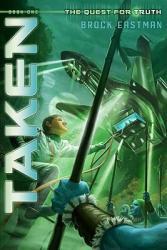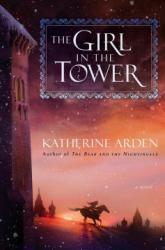
Katherine Arden's The Girl In The Tower is just as good, if not better, than the first book, The Bear and The Nightingale. Filled with more Russian Fairy tales, atmospheric literary prose, rich and strong characters, and the same enchanting setting of Medieval Russia, this book picks up right where the first one left off. It follows the story of Vasya, now a grown up woman she, instead of conforming to the role woman in her day usually play, of marriage or life in a convent, chooses instead a life of adventure. Leaving her home and traveling the vast Russian Wilderness while dressed as a boy, she soon is called upon to defend the city of Moscow and finds the threat greater and more deadly than she imagined. While fighting this threat, only she can stop, she is also forced to protect her secret as she comes upon her brother and attracts the attention of the Grand Prince of Moscow.
Part of what drew me to this book is the fairy tales, yes, but also the historical setting of Medieval Russia. Katherine Arden does a masterful job of weaving fantasy elements with real life historical details only a great historian would discover. Blurring the line between history, fantasy, and reality this book and, more importantly this series, is contemporary historical fantasy at its best. It is a sketch not only of real life in Medieval Russia, but also displays the power of story and demonstrates the importance of fairy tales and the lessons they can teach us.
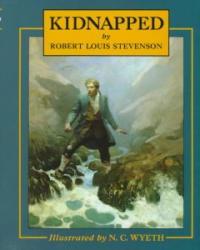
Another one of those “short adventures” that I have finally gotten around to reading, Kidnapped doesn’t suffer from some of the attributes that I found irritating about Captains Courageous . Sure, some of my qualms with Captains Courageous came from the audiobook itself but Kidnapped managed to have an easy-to-understand narrator as well as some sound effects and music that added to the experience of the book. As for the book itself, Kidnapped is pretty basic despite its title being only a small fraction of its plot.
Even despite its short length, a lot happens in Kidnapped. Aside from the obvious kidnapping, many events transpired because of it, including escaping and returning home. Of course, partly because of the short length of the book, the action moves at a pretty quick pace that was sometimes difficult to follow (which may also be an artifact of the time when it was written). The language in this book was easy to understand and is appropriate for young boys who want to dip their toe in the wide world of reading.
Part of me almost wanted the plot to focus more on the kidnapping since that’s what I expected the book to be about. Of course, perhaps my preferences are tainted by modern literature and the almost over-explanation of situations and scenarios. Kidnapped does a lot, but if it went more in depth with a few of the main points, it could have been a little more fascinating. As it is, the kidnapping itself happens so quickly that the reader hardly has time to understand what has happened before the main character has escaped. A little more time spent in the midst of the kidnapping would have added some excellent tension to an already adequate book.
A good short story for all ages, I give Kidnapped 3.5 stars out of 5.
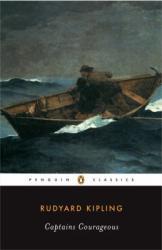
Captains Courageous is one of those classics that I just haven’t read, for whatever reason. I got the sense it was about being at sea, probably in the same vein as Moby-Dick or Treasure Island. And yet, I don’t know if I could tell you what happened in this book. Sure, the main character was picked up by a fishing vessel, and eventually, they learned how to deal with the harsh job of being a fisherman, but that’s pretty much it. The series of fishing adventures seem to be loosely tied together, and the overarching plot was weak at best.
Part of me wonders if the audiobook version of this classic was to blame. Not only did the narrator have a bit of an accent, but she did all the different dialects of the various characters based on their ethnic origins. While I would usually love this attention to detail, more than half the time, I could hardly understand what was being said. Furthermore, the amount of sailing/fishing jargon this book had completely lost me at times, as I have no experience or knowledge of this profession to understand what the characters are talking about.
The two aspects I did enjoy as part of this audiobook were the songs and the length. While I likely would have just read the lyrics of these sea shanties in the book with no understanding of how the tune would go, the narrator sang these songs, thus allowing me to appreciate them more than just the words would have provided. Secondly, while I didn’t understand what was going on for most of the time I was listening to this audiobook, it was still a short book. Therefore, I didn’t waste too much time listening to this book and could move on to different books that much quicker.
A classic that probably hasn’t aged well with time, I give Captains Courageous 2.5 stars out of 5.
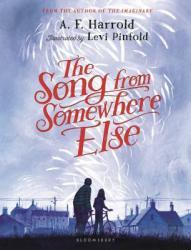
He was bigger than anyone else in Francesca's class. He was funny looking and he smelled weird. Why, oh why did he have to be nice to her and get her bag for her that the bullies had thrown into the stinging nettles? When the bullies chased them both to Nick's house, why hadn't she run somewhere else? Ugh, she would never live this down at school. A.F. Harrold's novel, The Song From Somewhere Else, will enchant readers age 9 - 12 with a story of another world, just waiting to be discovered.
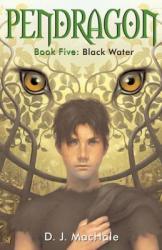
Black Water is the fifth book in the series Pendragon by D. J. MacHale. The story is engaging and tells of the protagonist's, Bobby Pendragon, endeavor to save a world by the name of Eelong. Saint Dane, the antagonist, allows the cat inhabitants of Eelong to spread mysterious plague, which could destroy their own civilization. The book excels at depicting the universe of Halla and creating a society that could function in today's world. The characters and their self-doubts are communicated to the reader in depth, and the book continues to expand the universe of the series. It also seems to show the problems with racism and oligarchy through the book's deeper meaning. The only problem that I have with the book is that it doesn't include or really expand upon the side characters much. I saw ample opportunity for the author to do this, and the book felt somewhat blank without it. I would recommend this book to people who like science fiction or adventure, as the book is filled with many of those elements.
Grade: 8
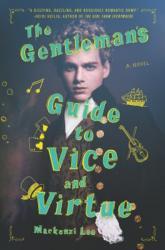
In the 18th century, it was rather common for young wealthy English folks to embark on a Grand Tour of continental Europe between their school years and their careers or higher education. Henry “Monty” Montague’s Grand Tour, however, is anything but common. Monty’s formal education at Eton ended rather abruptly, due to being caught in a rather compromising situation with another one of the boys. Now his future as his father’s heir is in jeopardy, and his tour is his last chance to redeem himself.
So it is that Monty departs for the continent, knowing that if he doesn’t manage to behave himself (at least in his father’s eyes), he’ll be left penniless. He’s accompanied by his younger sister, Felicity, herself off to a school in France, and his best friend Percy, who will be leaving England for law school at the end of their tour.
Monty naturally feels a bit overwhelmed by the mounting pressure on him to completely turn his own life around. However, understanding the plights of others isn’t something he’s ever been good at, and Felicity and Percy each have their own deep concerns about what awaits each of them at the end of their trip. None of them expect Monty’s knack for attracting trouble to draw them into a web of intrigue that leads them from France to Spain to Italy, pursued by highwaymen, pirates, and vengeful nobles. And none of them, least of all Monty, expected him to fall desperately in love with Percy along the way…
The Gentleman’s Guide to Vice and Virtue by Mackenzi Lee was everything I wanted it to be and more. Adventure, mystery, and romance all fall neatly into place in this YA treasure. It’s available now, so do yourself a favor and pick it up.
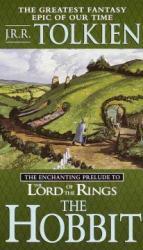
Originally written for his children, J.R.R. Tolkien's fantasy novel “The Hobbit” is hailed among book critics as a remarkable, introductory-level fantasy novel. It manages to engage readers with an epic and timeless plot, while also avoiding the use of profane language and violent scenes.
The tale is set in Middle Earth, home to a number of human-like species including the Hobbits, Dwarves, and Elves. Over the course of the novel, Tolkien provides a rich background of the history of these three species.
Namely, the majority of backstory is setup around the dwarves- who originally inhabited the “Lonely Mountain” and made their fortune off of mining gold. Their empire prospered until at last, a greedy, gold-seeking dragon named “Smog” wreaked havoc to their way of life.
Enter Bilbo Baggings, a middle-aged Hobbit settling down in the Shire. After he hosts a seemingly ordinary dinner party, his life is turned inside out, and the inner spirit of adventure is awakened with him. He joins in a quest to reclaim the dwarf home, and takes part in a number of adventures along the way.
I originally read this book after finishing the “Lord of the Rings” trilogy. While it’s true that this novel is aimed at a younger demographic, it is certainly still an engaging read for older teens and adults. J.R.R. Tolkien embeds a number of rich storytelling devices into his writing, and it makes the read an absolute pleasure!
If you decide not to try this novel, I would suggest reading “A Game of Thrones” by George R.R. Martin. It is certainly not as child-friendly, and has some pretty gruesome scenes, but Martin’s writing makes up for many of the imperfections of Tolkien’s work. Overall, The Hobbit is most aptly suited for readers aged 8-12, and serves as a great introductory novel to fantasy literature. For older readers, I might suggest a different read, but all the same, and in spite of your age demographic, The Hobbit is truly a timeless masterpiece of literature and is worth giving a try!
Reviewer Grade: 10
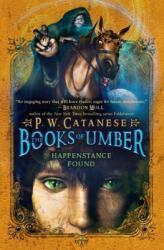
Happenstance doesn't know who he is or where he's from. When he's found in a cave by a team of explorers, he's whisked away into a world of magic and mystery, where he must come to terms with his elusive past and a strange new enemy. I couldn't put this book down. It was fun, adventurous, and surprising, with interesting characters and an engaging plot. I'd highly recommend to those who love fantasy and adventure stories.
Reviewer Grade 9
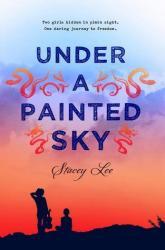
I really enjoyed this book because it was such an adventurous and suspenseful story: just my type. The main character in this story goes through so much I know I could never endure myself, but she kept pushing through it all and made it out all right. There were so many surprising things in this amazing book that happened that I never would have guessed.
Under A Painted Sky was probably the best book I've read this year. Like all books, it had a little blunder here and there, but overall I absolutely loved it.
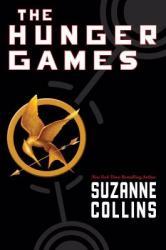
Ever since the release of Suzanne Collin's dystopian novel "The Hunger Games", her work has garnered international acclaim from some of the world's most reputable critics. Adopted into a series of wildly popular films and having been printed more than 23 million times, the staggering success of her novel begs the question, "Does The Hunger Games truly live up to its notoriety?" Well in fact, after having read it multiple times, I can personally say that it far exceeded my expectations.
After the ruin of North America and the collapse of democracy, an authoritarian government arises. In order to maintain oversight of its people, the capitol divides its dominions into twelve districts, each specializing in a different pursuit. Every year, the capitol hosts "The Hunger Games", in which a boy and girl from each district are randomly pooled into a survival competition. Participants must fight to the death in a futuristic arena, all the while being broadcasted live on TV.
Enter Katniss Everdeen, a 16-year-old teenager from the impoverish District 12. In an effort to protect her sister, she volunteers as a tribute to the game, but as she heads to the capital, she realizes that her life will never be the same. Through the course of the story, Katniss struggles to balance her conflicting emotions, and comes to understand the harsh reality of life in Panem.
As Katniss makes these revelations, the reader has the chance to pick up on a number of powerful themes, examples of which include the dangers of reality shows, the ever-growing obsession with fashion trends, and the consequences of desensitization to violence. Not only is this novel an action-packed and engaging read, but it also leads readers to share meaningful conversations about changing ideologies in the 21st century.
I picked up this read after watching the book-inspired film, and have been pleasantly surprised with it. While the movie makes fair and accurate adaptions to the story, it misses out on many of the themes presented in the books. For this reason, I would certainty recommend continuing on to read the novel after watching the movie, as there is plenty of unique content from the book. If you have not watched the movie, I would advise even stronger to pick up this read. For the reasons previously mentioned and more, I honestly am so glad to have read this book.
One complaint I might bring up is that while a large majority of book readers are young, the novel has some extremely gruesome scenes. If you are to read this book, be forewarned of violence. Furthermore, I found some passages difficult to read, due to the choppy-sentence structure used by Collins. This may just be a personal preference, but I felt that it was of detriment to the story.
Overall, "The Hunger Games" will certainty appeal to teens 13 and up and leave readers with discussion points about government, free-speech, sacrifice, moral desensitization, and other thought-provoking themes. It mixes an enthralling plot with rich and powerful messages- a formula bound for literary success.
Reviewer Grade 10
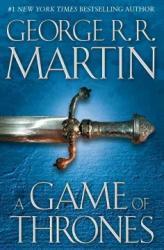
“A Game of Thrones” by George R.R. Martin tells the tale of various clashing households and their quest to conquer control over the seven kingdoms. Set in a distant, but vaguely familiar medieval-Europe, the story bears parallels to England’s “War of the Roses,” while also introducing its share of unique fantasy elements. As the reader progresses through the book, they follow the politics of the Iron Throne- a metaphor representing the complete and utter control a King possesses in a feudal government system. Furthermore, the reader tracks 8 character perspectives, which are alternated through passing chapters.
As the King rides north to Winterfell to meet with his trusted vassal, and friend, Eddard "Ned" Stark, he strikes up an agreement to anoint Eddard as the hand of the king. Reluctant, Ned follows the King back to the South, but as the plot continues to unfold, Eddard learns of a secret unbeknownst to the King and some of his most trusted advisers. With the death of the King and the ruin of Eddard’s house, war rages in Westeros- as several characters attempt to strike their claims on the Iron Throne.
I initially picked this book up after finishing J.R.R Tolkien’s, “Lord of the Rings” series and have been pleasantly surprised with it. Many fantasy readers have speculated that the literary masterpiece of Tolkien’s novels could not be out done, but I am now inclined to disagree. I thought the book was well-crafted and engaging as an intermediate to advanced reader. However, I would file the complaint that the book moves a bit slow for my taste. Some may lose interest in its plot, especially considering the sheer volume of the book series. The old-language also adds to this effect, as it may cause some readers to struggle following along.
Overall, I would say that this book is certainly worth a try for someone who enjoys medieval-fantasy novels. Admittedly, it will take a while to read and is certainly no small undertaking, but by sticking with it, I found myself enjoying every page more than the last!
Grade 10
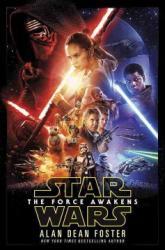
If you’ve been following along recently, you’ll know that I’ve been on
a bit of a “movie” kick when it comes to the audiobooks I’ve listened
to. While there are plenty of movies based on books, I haven’t really been
one to read novelizations of movies. That being said, I’ve found the
writing style in my own novels to be a bit of a novelization of the ideas in
my mind, since I usually try and describe scenes in a cinematic way. At any
rate, I was expecting a story that held close to the film, and this book
certainly delivered on that promise.
I’ll admit that the more I think about the plot and characters of The Force
Awakens, the more I find that it almost exactly matches the events of A New
Hope. However, there were some weaknesses in the first installment of the
Star Wars franchise that I feel are addressed in this recent installment.
Sure, all the elements are there, but they’ve been mixed around into
different characters, settings, and conflicts that add a bit more depth to
the story than the archetypical one presented in A New Hope. As a reboot, The
Force Awakens does an excellent job of calling back to what made the original
great, but doing so in a way that is still different enough to provide
interesting twists and questions.
One thing I do like about this version of the story, compared to the movie,
is the “deleted scenes” that help explain some of the plot holes from the
film. Maybe these scenes hindered the flow of the movie (or weren’t
important enough to include) but they certainly helped me understand the
story a lot better now that I know about them. Finally, while I know that
many films have “enhanced audio” for blind people, I’d almost recommend
these people listen to this audiobook instead. The music, sound effects, and
even many of the actors’ voices all are used at a pace that’s much slower
in order to really grasp what’s happening with the story.
A fantastic audiobook that faithfully captures everything (and more) that
made the film great, I give Star Wars: The Force Awakens 4.5 stars out of 5.
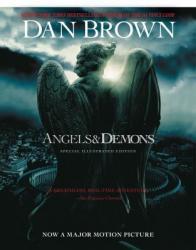
While Angels and Demons is not nearly as popular as its sequel, the famous (if not infamous) The Da Vinci Code, the elements which led to its successor’s success are certainly all contained within this first book in the Robert Langdon series. Of course, just because you have the materials to build a nice house doesn’t mean that it magically becomes a mansion. Despite containing many of the elements that made The Da Vinci Code so good, Angels and Demons feels a little underdeveloped in quite a few areas.
First, the protagonist, Robert Langdon, is supposed to feel like an “Indiana Jones”-type character, but with a specialty like symbology as his background, I just can’t buy the action-hero transformation of this everyday academic. Add to this the almost repetitive nature of his “discoveries” wherein he makes an assessment, then goes to the location of the assessment only to find that he didn’t think of it in the right way and thus requiring the whole plot to shift gears as he rushes to the new location. He eventually had better predictions, but by then it felt repetitive.
Secondly, the whole “treasure hunt” to find the antimatter (of which I feel CERN is a more recognizable name than it was back in 2000) seemed to take a back burner to the parallel plot of the pope’s death and finding his replacement. It is hard to focus on both plotlines, especially since both of them had pretty predictable endings. Finally, the romance aspect of this novel seemed quite forced, even to the point where the final scene of the book felt like it was ripped out of a James Bond story. Wherein a modicum of charm from the male protagonist makes his female counterpart swoon with undying affection that wasn’t in any part of the prior plot.
A rough start to the Robert Langdon series, I give Angels and Demons 2.5 stars out of 5.
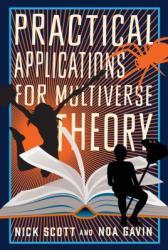
As someone who enjoys learning about the many interesting unknowns in our universe, the mere title of Practical Applications for Multiverse Theory (2016) caught my attention from the get-go. The ideas of parallel universes coexisting in an invisible space next to our own is something I eventually want to cover in my own writing (tentatively titled The Slumberealm Saga). And while this book somewhat delivered on the premise of its title, it unfortunately did so through an incredible plethora of clichés. Due to the authors’ background in improv comedy, it’s clear that they merely wrote this book to capitalize on the style’s random nature.
I’m not sure who the target audience for this book might be, since the main characters are high school students who use an awful lot of foul language. I would think it’s aimed at being a Young Adult (YA) comedy, but most of the laughs seem forced and trite. Told from two different perspectives, Scott and Davey, both characters aren’t really that likeable, and neither of them change that much (if at all) by the end of the book. In fact, it’s almost obnoxious how Davey is essentially a jerk to everyone, especially Scott, even though it becomes incredibly clear she should be more accepting of him earlier on in the plot.
Speaking of plot, it seems to drag in quite a few places, especially in the beginning as both characters start noticing the multiverse collapsing in on their school. Unfortunately, due to the aforementioned clichés, the entire rest of the plot was pretty predictable, even if the different universes were quite random (and even that randomness was cliché). Nosebleeds indicating a fracture in spacetime, narcissistic cheerleaders, nerdy loners. Everything fits nice and squarely into the formula for a YA book (despite the obscenities). The problem with this is that the authors clearly saw they were writing clichés, because there were a few points that could have been cliché (like the two main characters falling in love), but just weren’t there at the end, thus leaving the reader somewhat unfulfilled. If you’re going to follow a formula, it needs to be followed in its entirety.
An easy and fast read with nothing much to offer, I give Practical Applications for Multiverse Theory 2.0 stars out of 5.
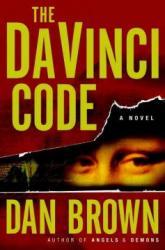
What a difference three years makes! Even though it contains all the same tropes and motifs that Angels and Demons did, The Da Vinci Code eliminates the fluff and focuses on the strengths of these individual pieces to create an enthralling adventure through Christian history. I will admit that I first read this book because I was curious about the controversy that surrounded it. While Dan Brown is a fantastic storyteller, and many of his connections and links to Christianity made sense, I still maintain that, at its core, The Da Vinci Code is just well-written fiction.
This time around, Robert Langdon is much better suited for the task of finding the “Holy Grail” instead of being a glorified Roman tour guide. His expertise in symbology certainly helped to drive the plot forward, even if it sometimes was in a misleading direction for the sake of a twist. I did appreciate how, even if a clue didn't immediately come into play, it became useful later to help round out the plot. It wasn’t just a series of “find me a rock” exercises but had a parallel set of intersecting strings and subplots that drove the story forward to its exciting conclusion.
And while the female protagonist was much more developed than the one in Angels and Demons, the villains also had more depth to them as well. Instead of a few individuals using the name of a huge organization like the Illuminati to create the conflict, a singular man with a singular goal helped to create the “chase” that propelled Robert Langdon across Christendom to find the Holy Grail. While both The Da Vinci Code and Angels and Demons share almost identical plot structures, the former shows that the execution of such a story is precisely what makes one a great read and the other an exercise in eye-rolling.
An exciting treasure hunt filled with fictional historical connections, I give The Da Vinci Code 4.0 stars out of 5.
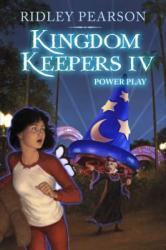
I recently read Kingdom Keepers: Power Play by Ridley Pearson. This book is the fourth in the series. Unfortunately, Power Play wasn't the best book in my opinion, because it is quite confusing and I feel only appeals to a certain reader.
Kingdom Keepers is a series about a group of teenagers who volunteered to be a part of a revolutionary invention.The Kingdom Keepers consist of five
members: Finn Whitman is the leader of the group, Philby is the brains, Charlene is the athlete, and Willa and Maybeck are the more normal kids. DHIs (daily holographic imaging) was invented by the imagineers to supposedly help guide guests around the parks, but the real purpose of this was the teenagers would actually have to take part in the battle against the Overtakers, a group of Disney villains, set to take over the park, and potentially the world. Power Play begins in Disney Quest, a kind of virtual theme park where the Kingdom Keepers went for a school fundraiser. When a ride the Keepers’
leader Finn goes on with his friend Amanda goes out of control, they find the Overtakers are behind it. Finn goes to the prison where the overtakers are held and tries to stop an Overtaker escape from happening.
I liked the fact this book takes place in the real world, but at the same time seems very futuristic and it's a good story about friendship and courage. Holograms at Disney World is a cool concept, but I think the author makes the story too complicated. There are multiple plots and twists going on at once, I sometimes forget things that happen. There are only 13 chapters in the 400 page book, sometimes up to 60 pages at a time, and most of what's happening in the chapter is completely unnecessary. These unnecessary parts make no difference to the story, other than the fact it leads the characters to the right place at the right time in an interesting way. Also, he uses very unspecific wording when it comes to talking about the characters in the group and you don't always know who he's talking about.
I wouldn't recommend this book, because of how confusing it is.
Unless you are a hardcore Disney fan, in that case you might want to give it a try. There are other books in the series and I think the first three tend to be a better read, it's more fun and the author doesn't get carried away with the story. The first book is the best in my opinion. So, if this type of book appeals to you, then I would definitely give it a try, but if you’re looking for a good or quick read, I wouldn't recommend.
To sum up, Kingdom Keepers: Power Play, the story of friendship and courage, is not the best read for the general audience. If you are sure you want to read I would definitely recommend the first couple books. The first stories tend to be better and less confusing. I am glad I read some of this series, to check it off my list of books to read, but I don’t think I would read this book again.
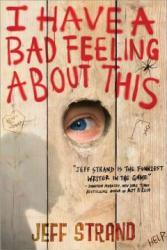
In I Have A Bad Feeling About This by Jeff Strand, Henry, a 17 year old boy, is sent to a survival camp by his parents because they think he's a wuss, and to be honest he is kinda wussy. But this camp is not what it seems. I really like how embarrassing Henry was, I could definitely relate. I didn't like that the book was dragged on, it took a few chapters to get to the really good action. I picked this book because it's title was intriguing to me and made me want to find out what happened. This book was extremely surprising and made me have to do a double take. I could relate to all the wimpy kids who were sent to the survival camp because let's be honest I can't throw a ball five feet. This was not the best book I have read this year but if someone asked for a good book recommendation I would totally recommend this.
Reviewer Grade: 9
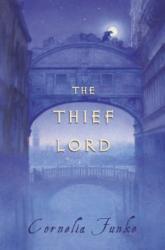
In Cornelia Funke's "The Thief Lord", the most famous thief in all of Venice is a young boy who goes by the name of The Thief Lord. He has recruited a large band of misfits to aid him in these crimes -- including runaway orphan brothers Prosper and Bo, who are being pursued by a detective hired by their aunt and uncle. The story had a great pace and was fun and engaging. The setting was described vividly and could be considered a character of its own.
The only flaw I saw was in the ending, which seemed out of place and didn't flow right with the rest of the story. But, the book was still great. I'd highly recommend it to readers of all ages.
Review Grade: 10
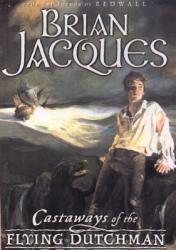
To be honest, I wasn't sure I was going to finish this book. It was hovering around a 2 (Meh) when all of a sudden the author gave it a left turn and I found myself in a good old fashion treasure hunt story. Like the 'Gold Bug' by Poe, it's full of great and cryptic clues to unravel. Fantastic!! The author gives us a taste of the 'Flying Dutchman' legend and then joins us with a young boy and his dog who are traveling a strange road through life. There's three books in this series so if you like the adventure - enjoy.





 Ruth Holley Library will be temporarily closed for approximately one week starting Mon., Dec. 2 to complete roof repairs.
Ruth Holley Library will be temporarily closed for approximately one week starting Mon., Dec. 2 to complete roof repairs.